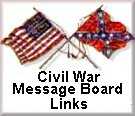3 MILES WEST OF ROMNEY, Va.,
January 19, 1862.
Dear Uncle: I have had nothing of much importance to write up to the first of this month; and since then we have been moving from place to place so that I could not write.
On the 1st of January, as you have heard from the newspaper, we left Winchester, taking a western course. Three days match, camping at night without tents or blankets on the snow-covered ground, brought us to Bath, where the celebrated Berkley Springs are. Here there was quite a large force of the enemy, but on our approach they ran off, leaving their sick, a number of tents, provisions, stores, &c. Our troops double quicked through the town in pursuit of them, but were unable to get but twenty prisoners. These belonged to the 39th Illinois Regiment. I saw them and was near by when one was captured. I had charge of the Ordnance train on that day, and had gone forward to know what to do with it when a little fellow run down to the road and said there was a Yankee at his house, which was about two hundred yards distant. We sent up some men who found the Yankee under the bed. He appears very well satisfied with his situation.
At Bath our troops were divided,--Col. Rusk, of the 3rd Arkansas Regiment, took his Regiment and the 37th Virginia and went west of Bath towards the Capon Bridge with the object to burn this bridge, which is on the Baltimore and Ohio Railroad while the balance of our troops went north toward Hancock, Maryland. We arrived at that place in a short time—or more properly opposite it, for it is on the other side of the Potomac—stayed there for two days without anything to eat or a blanket to sleep on. We shelled the town to our satisfaction, and Col. Rusk returning after having accomplished his object, we all turned back, having, I presume, done all we intended. We came twelve miles from Bath where we camped three days to recruit our health. After the experation of that time we took up our line of march for Romney, where there were 4,000 of the enemy under Gen. Kelly. We reached Romney after a march of five days and found the Yankees had left just as soon as they heard we were advancing on them, notwithstanding they were strongly fortified. We got a considerable lot or stores from them here but not as much as we got at Bath and Hancock.
Now I have told you what we have done I will next tell you what it has done for us. Our Regiment left Winchester with seven hundred men and brought to Romney only two hundred and forty men. The Washington Rifles left Winchester with sixty-two men and now have twenty-five. Two-thirds of our Regiment are now sick enough to be in the Hospital. I notice that the army correspondence from Manassas think it is hard for their sick to lay in the horrid Hospitals, and speak of the hardships their troops undergo in winter quarters. But what would they think of our fix? In the bleak climate of North Western Virginia, the ground covered one foot deep with snow, with the meager protection of a common tent and half the time not even that, traveling in the day over the rough frozen road, some men with their bare feet on the ground. This is no exaggerated picture, we see it every day. I marched day before yesterday seven miles with my toes on the icy road, having worn out the second pair of shoes since I left Winchester.
It would move the heart of any one who is not in the army (for all of us are used to it,) to go through this camp and hear the terrible coughing—some coughing until they vomit. Yet we have no Hospital for our sick. Few men at home have any idea what we are undergoing, nor is it possible to tell all we have stood.
Yours affectionately,
E. P. HOWELL.
.jpg)









